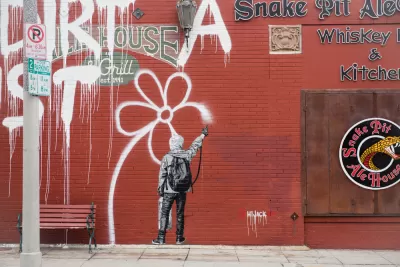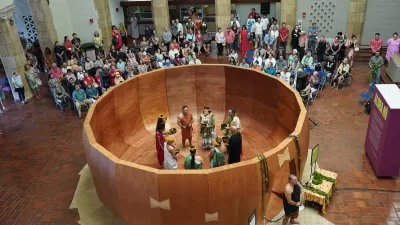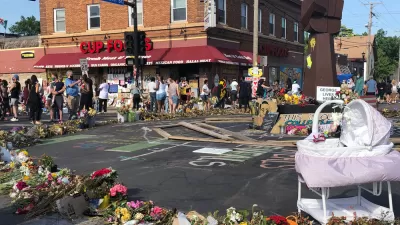Residents use creative engagements to envision an arts and innovation district without displacement in Boston’s Upham’s Corner.

Jason Moreno first learned about redevelopment efforts taking place in his Boston neighborhood on a sunny summer afternoon in July 2018 at his local outdoor basketball court. Dudley Street Neighborhood Initiative (DSNI) had set up a pop-up event to engage local youth about their experiences in the neighborhood. Moreno remembers being asked “what I’d like to see in the neighborhood.”
A year later, Jason was elected to the youth board of DSNI and spent the summer in its youth program, envisioning how a former bank building recently acquired by DSNI’s community land trust could be redeveloped into a youth-friendly space. The program’s culminating project was activating the building with temporary installations using recycled materials, inviting people to interact with what it might be like in the future. For one afternoon, the youth repurposed the first floor of the building into a bowling alley and arcade, Zen garden with koi pond, and movie theater/café.
These arts-based and interactive methods have become part of how DSNI and its community partners are collaborating with the city of Boston to revitalize the Upham’s Corner commercial district into an “arts and innovation” district. Their vision is development without displacement, a tall order given that arts development has often led to gentrification. And Boston has already been experiencing the pressures of a hot real estate market over the last decade.
What makes this redevelopment process different from most is that a democratically-controlled community-based organization owns one of the redevelopment sites and as a result, is a partner in guiding the overall process. DSNI is a co-facilitator with the city of Boston of the Upham’s Corner Implementation (UCI) process. Like many neighborhood groups, DSNI was formed in the mid-1980s to establish community control over development. But DSNI stands apart from most groups with ...
FULL STORY: Arts for Community Control: Planning an Arts and Innovation District Without Displacement

Alabama: Trump Terminates Settlements for Black Communities Harmed By Raw Sewage
Trump deemed the landmark civil rights agreement “illegal DEI and environmental justice policy.”

Study: Maui’s Plan to Convert Vacation Rentals to Long-Term Housing Could Cause Nearly $1 Billion Economic Loss
The plan would reduce visitor accommodation by 25% resulting in 1,900 jobs lost.

Planetizen Federal Action Tracker
A weekly monitor of how Trump’s orders and actions are impacting planners and planning in America.

Waymo Gets Permission to Map SF’s Market Street
If allowed to operate on the traffic-restricted street, Waymo’s autonomous taxis would have a leg up over ride-hailing competitors — and counter the city’s efforts to grow bike and pedestrian on the thoroughfare.

Parklet Symposium Highlights the Success of Shared Spaces
Parklets got a boost during the Covid-19 pandemic, when the concept was translated to outdoor dining programs that offered restaurants a lifeline during the shutdown.

Federal Homelessness Agency Places Entire Staff on Leave
The U.S. Interagency Council on Homelessness is the only federal agency dedicated to preventing and ending homelessness.
Urban Design for Planners 1: Software Tools
This six-course series explores essential urban design concepts using open source software and equips planners with the tools they need to participate fully in the urban design process.
Planning for Universal Design
Learn the tools for implementing Universal Design in planning regulations.
Caltrans
Smith Gee Studio
Institute for Housing and Urban Development Studies (IHS)
City of Grandview
Harvard GSD Executive Education
Toledo-Lucas County Plan Commissions
Salt Lake City
NYU Wagner Graduate School of Public Service





























